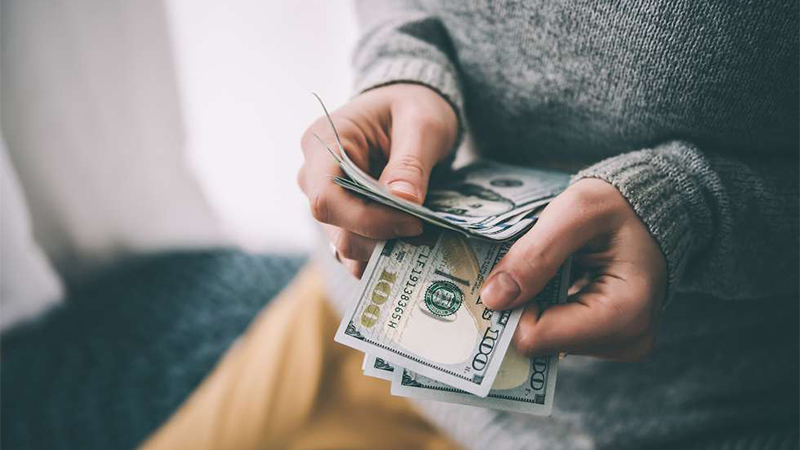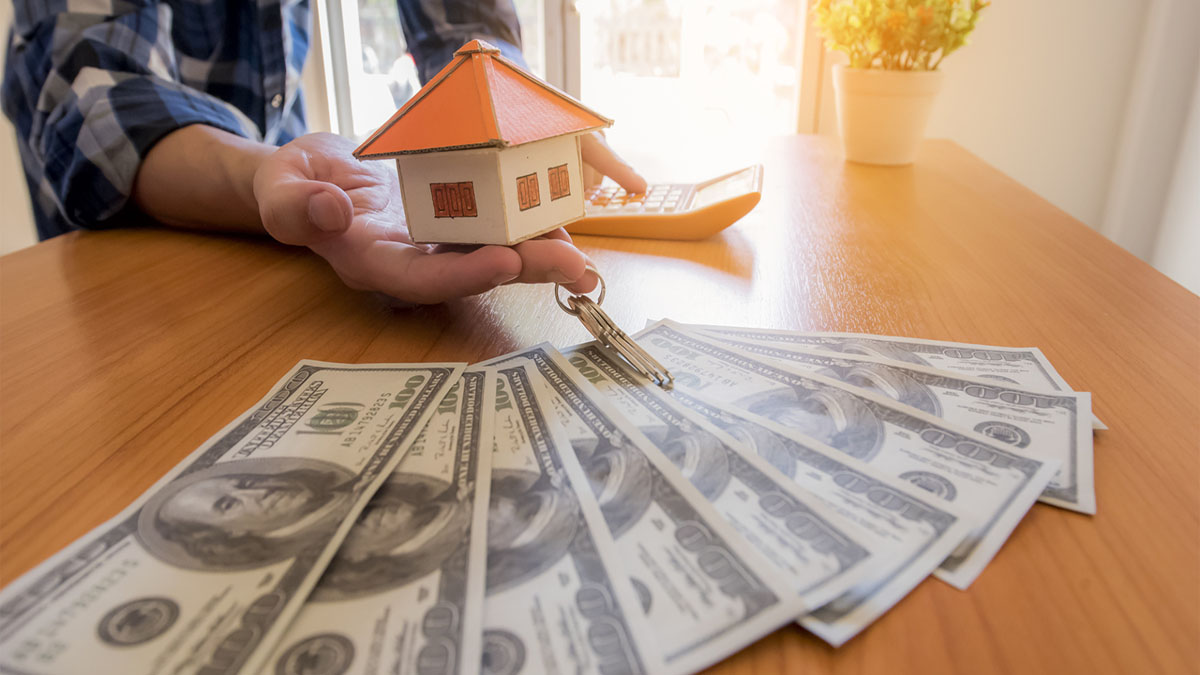Once you buy your first home, it never ends.
At least, it doesn’t end for most people. You have to make your mortgage payment, month after month, year after year, decade after decade.
Naturally, if you buy one house and stay in it for the rest of your life, you’ll eventually pay off the mortgage. It’s much more common, though, that you’ll end up buying several homes in your lifetime, or refinance your mortgage several times. And each time you do, the clock starts all over again. Another 15, 20 or 30 years of mortgage payments are in your future.
Unless you plan on spending the rest of your life living in your parents’ basement or a small apartment, there’s only one way to avoid those never-ending mortgage payments: buying your house with cash. We probably don’t have to tell you, however, that’s much easier said than done.
The average single-family home in America now sells for right around $300,000. And according to the consumer finance company Bankrate, the average American household has less than $10,000 in the bank.
Many people have a lot more than that in stocks, retirement funds or other investments, but there’s usually a big price to pay for converting those assets into cash. Is it worth doing? Only a financial advisor can fully answer that question.
But it doesn’t matter whether you’ve managed to save up enough money to buy a home outright, you’ve made enough profit on your old home to buy a new one for cash, or you’ve liquidated other assets. There are a lot of minefields to avoid when you’re purchasing a house for cash.
Let’s check them out.
Why Pay Cash for a House?

There are many good reasons to buy a house for cash, if you can afford to do it. And the annoyance of having to make a mortgage payment every month is far down the list.
Paying Cash Saves You a Lot of Money
Everyone knows that home loans cost a fortune over time. Here’s one example. A 30-year, 4% fixed mortgage on the $300,000 home we’ve mentioned, with a 20% down payment, will end up costing you an extra $172,000 in interest. In other words, you’re borrowing $240,000 and paying back more than $400,000.
That should immediately grab your attention, if you might be able to pay cash instead. As an added bonus, you won’t have to pay for monthly mortgage insurance, either.
Financial Situations Change
When buying a house with a mortgage, you’re committing to making the payments for decades without knowing what your financial situation will be five, ten or twenty years from now. If you’re young and have a good career, you may feel comfortable expecting that your income will go up, and not down, over the length of your mortgage.
If you’re a little older, though, things could be different. You might be approaching retirement or dealing with illness, disability or job loss by the time your mortgage is in year 20 or 25 – and the mortgage payment that seems reasonable today might be a burden then.
The housing market may also take a downturn during the mortgage term, making your house worth less than you paid for it. Refinancing or selling your house might no longer be an option if you’re underwater on the mortgage.
Paying cash now greatly reduces the risk of financial difficulties down the road.
It’s Often Easier to Buy When Paying Cash
Let’s say a home seller has two equal offers to consider. One potential buyer has lined up financing, and the other is paying cash. Which offer is the seller more likely to accept?
In almost every case, the seller will take the cash. There’s no chance that the deal will fall through because the buyer’s financing falls through, and cash deals can usually close more quickly since loan approval isn’t required.
Some sellers even offer a discount on their home’s price for cash buyers.
Closing Costs are Lower
This is a relatively small matter compared to the cost of a house, but cash buyers don’t have to pay some of those annoying closing fees that always add up, like loan origination fees and discount points. And you can decide how much home insurance you need to carry; there’s no mortgage company dictating terms to you.
OK – we’ve finally gotten to this one: there’s no annoying monthly mortgage payment, either.
Bottom Line: There are numerous financial advantages to paying cash for a house, and the transaction is more likely to close quickly and without any problems.
Should You Pay Cash for a House?
We’ve already given you the best answer: ask your financial advisor.
Here are a few issues to consider, though:
- There’s a cost to liquifying assets, whether it’s in taxes or lost investment potential. Those costs may end up being higher than the financial benefits you’d gain by avoiding a home loan, particularly when mortgage rates are near historic lows as they have been recently. In short, it may be smarter to borrow.
- A related note: even if you have the cash to pay for a home, you can usually make more with it in investments other than real estate. Your house will only appreciate substantially in hot markets, which happen just occasionally. There’s also less overall risk when you’re invested in a diversified portfolio. A home isn’t an investment; it’s a place to live.
- You won’t be able to deduct mortgage interest payments on your taxes.
- It may be more difficult to access your cash, if it’s all invested in your home and you run into a financial emergency.
You’ve considered all of these issues, talked to your financial advisor and accountant, and you’re ready to move forward on a home purchase for cash? Then let’s move on.
Bottom Line: There are some reasons to hesitate before buying a house for cash; most should be discussed with a financial advisor before making a decision.
Buying a House with Cash: Step by Step
1. Get Your Money Ready
You won’t have to show up for open houses or private showings with a suitcase full of cash, of course. But before you start looking at homes and making offers, you’ll usually have to prove that you can afford to buy in the price range you’re considering.
When you’re obtaining financing, that’s done with a pre-approval letter from a lender. When you’re paying cash, you should be able to present a letter from your bank stating that you have the available funds.
The bank won’t give you that letter until your cash is securely deposited into a liquid account and available for withdrawal. So if you plan to take money out of an investment or retirement account, sell stocks, or put together the funds in some other way, you’ll need to collect all of those funds and put them in the bank, ready for use.
(A bank statement showing your balance may be enough proof for many realtors, but it’s not the best idea; you should keep some of the private information that’s on your bank statements private.)
2. Go Shopping
Looking for a house is even more enjoyable when you know that you already have money in the bank to pay for it, and don’t have to worry about mortgage approvals.
Be careful, though. Just because you have (as an example) $300,000 in the bank, that doesn’t mean you should spend all of it on your dream home. You’re still going to have to pay closing costs, home insurance bills, HOA fees, and the cost of any repairs or upgrades that the home needs.
You might also want to keep some cash in reserve; there’s a well-known 1% rule that suggests budgeting 1% of your home’s value for maintenance and repairs every year. That’s $3,000 annually for our theoretical $300,000 home. And if you don’t have an emergency reserve for medical or other family issues, that’s also worth considering before you spend everything you’ve got on a house.
3. Have Your Earnest Money Ready
Even if you’re going to be handing over a huge chunk of cash at the closing, you’ll still need to give the seller (or their agent) the earnest money that has to be submitted along with a formal offer. In most cases, they don’t want your cash; they want a cashier’s check, which can come from the bank where you’ve put your treasure trove, or any other source.
4. Go Through the Offer, Inspection and Appraisal Process as Usual
No matter what form your final payment will take, the actual buying process is the same. That means submitting an offer (with all necessary contingency clauses) through your realtor, negotiating with the seller, having the house inspected and appraised, making sure the title search is conducted successfully (purchasing title insurance if necessary), arranging for homeowner’s insurance, and preparing for the closing.
Your realtor will walk you through all the steps if this is the first time you’ve bought a home – it’s the same process they handle all the time. It just may happen more quickly because there’s no loan approval to wait for.
5. Make Sure Your Funds are Ready for Closing
A house closing may seem like a never-ending recitation of legal terms, and dozens of documents that have to be signed. In reality, though, the key to a closing is handing over the money to the seller – and they don’t want cash.
They’ll want either a wire transfer or cashier’s check for the balance. So first be sure that you know the exact amount of money that has to change hands, and then either obtain a check from your bank or arrange for the wire to be sent on the day of the closing.
6. You’re Done!
What are you looking here for? You’ve bought your house for cash. Congratulations!
